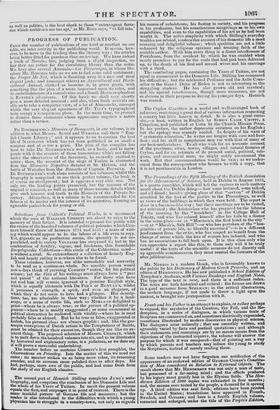Selections from Cobbett's Political TI - Orks, is a monument which the
sons of WILLIAM COBRETT are about to raise to the memory of their father. It is intended to present the public with the cream of the hundred volumes of political polemics which Con- BETT himself threw off between 1794 and 1835 : a mass of writ- ing which would appear to be the labour of a life even to copy. Yet, gigantic as its production seems, the quantity is not un- paralleled, and in variety VOLTAIRE has surpassed it; but in the combination of fertility, vigour, and freshness, this formidable Encyclopwdia Cobbettana—this circle of the Cobbettian mind— is without a rival. So extraordinary a collection of homely Eng- lish and hearty railing is nowhere else to be found. These volumes, however, are alike unreadable and unworthy to be read as a continuous whole. No sensible person would now-a-days think of perusing Costarrr " entire," for his political science; yet the C:lite of his writings must always form a "part and parcel" of the national literature. For those who have not read him will remain ignorant of a genuine English style, which is equally idiomatic with DE FOE'S or RUNYAN'S, whilst it posaesses a strength, a spirit, and even an elegance, of which they do not seem to have had a glimpse. His descrip- tions, too, are admirable in their way ; whether it be a land- scape, or a scene of rustic life, such as MORLAND delighted to paint—where lie is always true; or the person of a political op- ponent—where he is mostly exaggerated ; or some economical or Political abstraction he endowed with vitality—where he is most probably false or absurd. But be he true or false, exaggerated or
foolish, his pictured ideas are always graphic; and, like the gro- tesque conceptions of Dutch artists in the Temptations of Saints,
must be admired for their execution, though they are like no ex- istent thing. The proposed selection of Messrs. CORBETT, which is to melt down the hundred volumes into six, and to be illustrated hy historical and explanatory notes, is a judicious, as we dare say it will prove a successful undertaking. The number before us contains CoseErr's first pamphlet, the Observations on Priestley. Into the matter of this we need not
enter : its manner strikes us as being more sober, its reasoning sounder, and its sarcasm mom polished than in after days. He had, perhaps, more awe of the public, and had come fresh from the study of our English classics.


























 Previous page
Previous page